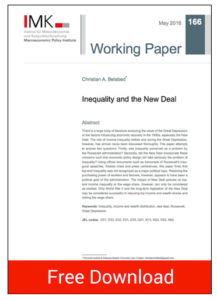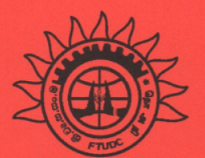 There is a large body of literature analyzing the onset of the Great Depression or the factors influencing economic recovery in the 1930s, especially the New Deal. The role of income inequality before and during the Great Depression, however, has almost never been discussed thoroughly. This paper attempts to answer two questions. Firstly, was inequality perceived as a problem by the Roosevelt administration? Secondly, did the New Deal incorporate these concerns such that economic policy design did take seriously the problem of inequality? Using official documents such as transcripts of Roosevelt’s inaugural speeches, fireside chats and press conferences, this paper finds that top-end inequality was not recognized as a major political topic. Restoring the purchasing power of workers and farmers, however, appears to have been a political goal of the administration. The impact of New Deal policies on top-end income inequality or the wage share, however, can only be considered as modest. Only World War II and the long-term legislation of the New Deal may be considered successful in reducing top income and wealth shares and raising the wage share.
There is a large body of literature analyzing the onset of the Great Depression or the factors influencing economic recovery in the 1930s, especially the New Deal. The role of income inequality before and during the Great Depression, however, has almost never been discussed thoroughly. This paper attempts to answer two questions. Firstly, was inequality perceived as a problem by the Roosevelt administration? Secondly, did the New Deal incorporate these concerns such that economic policy design did take seriously the problem of inequality? Using official documents such as transcripts of Roosevelt’s inaugural speeches, fireside chats and press conferences, this paper finds that top-end inequality was not recognized as a major political topic. Restoring the purchasing power of workers and farmers, however, appears to have been a political goal of the administration. The impact of New Deal policies on top-end income inequality or the wage share, however, can only be considered as modest. Only World War II and the long-term legislation of the New Deal may be considered successful in reducing top income and wealth shares and raising the wage share.
